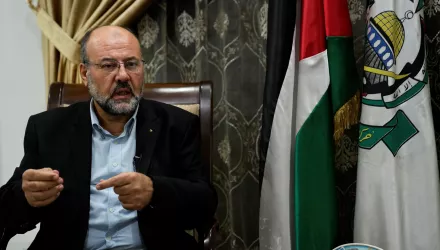The United States and its European allies appear unable or unwilling to intervene effectively and forcefully in Syria. Therefore it is time to consider a military solution under the auspices of the Arab League to protect Syrian civilians from further violence and ultimately dislodge the government of Bashar al-Assad.
Over the past two-and-a-half years, gut-wrenching images of unspeakable, indiscriminate violence against civilians in Syria have shocked the world. By the latest United Nations estimates, over 100,000 Syrians, including many children, have been killed as a result of the Assad regime’s criminal behavior.
Whether through the murder of peaceful protesters, the shelling of residential quarters with chemical weapons, or the execution of soldiers who refuse to open fire on their countrymen, the Syrian regime has systematically defied even the most basic international moral and legal standards.
Military intervention by Arab League forces would be the most legitimate way to bring an end to the atrocities of the Assad regime’s security forces. Nevertheless, the political and military barriers remain formidable. Currently, there is no solid Arab consensus on intervention or a credible joint military capability, especially with Egypt’s armed forces bogged down in dealing with the aftermath of the collapse of the Muslim Brotherhood. But this has to change!
The Arab League should create a Military Unified Command to expand military aid to the Syrian opposition. But sending aid is not enough. In order to dislodge the Assad regime’s premier fighting forces — the Fourth Armored Division and the Republican Guard — the Arab League should assemble an Arab army of 75,000 to 100,000 men to take up positions along Jordan’s border with Syria — a potential staging ground for an invasion.
A sea embargo could be implemented with the help of Turkey, which is already sealing its own border with Syria. Through an on-the-ground assault with the Arab Unified Forces supporting the Free Syrian Army, and the cutting off of Syria’s borders, the Assad regime would slowly be choked and destroyed, replaced by a large Arab military contingent that could keep the peace and guarantee the security of the country’s minority groups.
An Arab-led military solution in Syria would capitalize on several historic trends that are now coalescing.
As is clear from debates in Britain and the United States, the West is going through a democratic awakening when it comes to the use of force. Leaders in both the United States and Britain have chosen to delegate the decision to intervene to elected representatives.
Their hesitation is understandable considering the blood and treasure the United States and its allies have lost bringing down tyrannical regimes in Afghanistan, Iraq and Libya. Yet their investments have brought small returns and big problems, as these wars have bloated their budgets, left them despised throughout the Islamic world, and brought few rewards in the form of peaceful or democratic states.
This is also a pivotal moment for the Arab world. Finally shedding the last vestiges of colonialism, the region is grasping the fact that it must take a difficult yet vital step into independence and begin to fully manage its own affairs — including military ones.
As the West moves away from its imperialist mission to create a “manageable” Middle East, the Arab world is also slowly moving away from broken systems, fabricated borders and debilitating dependencies. Indeed, the confusion and contradiction in most Arab states about Western intervention — for example, wanting the West to intervene in Syria but not in Egypt — is itself a sign that Arabs are emerging into a more open and collaborative age in which they must debate and resolve their own political and security dilemmas.
It is also a particularly propitious time for unified Arab action because there is a widespread realization among the Arab states that their lethargy when it comes to Syria is simply unsustainable.
Most Arab states are intricately engaged with, deeply repulsed by, or historically linked to the events in Syria; as a bloc, they possess the military, diplomatic and financial might necessary to carry out and complete the task; and no group of nations can lend more legitimacy to an armed intervention. Many Arabs across the Middle East and North Africa believe that their governments must now assume the solemn mantle of collective leadership for the sake of the Syrian people.
Given the overwhelming evidence of the Assad regime’s extreme, unrelenting brutality, a peaceful transition appears highly unlikely. Force must be used.
Yet it should not be the same kind of force the West has used for centuries across the Arab world; those interventions have left the region a shambles and fueled resentment of Western imperialism. Armed intervention in Syria must come from within the Arab world, it must be multinational, and it must be organized. Only the Arab League can fulfill these conditions.
Nawaf Obaid is a fellow at the Belfer Center at Harvard University’s Kennedy School of Government. Jamal Khashoggi is the editor in chief of the Al Arab Satellite News Channel.
Khashoggi, Jamal. “The Arab D-Day.” The New York Times, September 8, 2013

